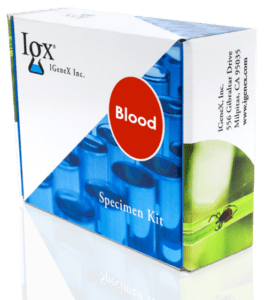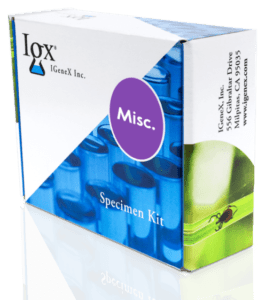Ticks are known to act as vectors for numerous illnesses, the most well-known being Lyme disease. Even when a tick-borne disease doesn’t develop, tick bites can still pose health risks.
One uncommon, but potentially life-threatening side effect from a tick bite is called Alpha-gal Syndrome, or AGS. Like many other tick bite symptoms, AGS is not widely known or understood. However, being aware of this effect can be crucial in correctly diagnosing and treating it.
What is Alpha-gal Syndrome, and how do you manage it? Let’s take a closer look.
What is Alpha-gal Syndrome?
Alpha-gal Syndrome is a food allergy wherein someone experiences a mild to severe reaction to red meat or other byproducts made specifically from mammals, such as dairy products and gelatin. Unlike other tick-borne diseases, it is not considered an infection.
Alpha-gal (galactose-α-1,3-galactose), is a sugar molecule that occurs in non-human mammals. Experts presume that ticks receive alpha-gal molecules from biting cows, sheep, and deer, which they then transfer to a human host through feeding.
Antibodies will target alpha-gal as something that needs to be cleared out in order to prevent disease by the immune system. When this occurs, the response is sometimes so strong that it prevents the person from eating red meat without side effects.
Because AGS cases are not nationally notifiable to the CDC, there are no precise statistics on how common it is. An estimated 110,000 cases were suspected between the years 2010 to 2022.
In the United States, AGS is most commonly transmitted by the Lone Star tick, and cases of Alpha-gal Syndrome are usually reported in the south, east, and central US, though deer populations have spread the Lone Star tick to new regions.
Alpha-gal Syndrome is also sometimes referred to as a ‘tick bite meat allergy’ and an ‘alpha-gal allergy.’
Symptoms of Alpha-gal Syndrome
When someone with AGS eats an allergenic food, they typically develop symptoms within 2-6 hours. This relatively long response time compared to other types of food allergies may be because AGS is triggered by carbohydrates, which take longer to digest, versus proteins, which are the cause of most other food allergies. Reactions can range from mild to severe and can vary over time, depending on the person.
These are some possible symptoms of AGS:
- Diarrhea
- Indigestion, heartburn, or severe stomach pain
- Vomiting and nausea
- Hives or an itchy rash
- Faintness or dizziness
- Difficult breathing or shortness of breath
- Drop in blood pressure
- Swelling in the tongue, eyelids, throat, or lips
AGS can be life-threatening in some instances. If someone goes into anaphylaxis, they may need urgent medical care. Any of the above symptoms may be signs of anaphylaxis. Acute symptoms may include all or a combination of the following: Skin reactions (flushing, rash), respiratory or cardiovascular symptoms, and severe gastrointestinal symptoms.
Foods That Contain Alpha-gal
While red meat is most commonly associated with alpha-gal, any animal byproduct from a mammal can trigger the reaction.
Products that commonly contain alpha-gal:
- Meat from mammals (beef, pork, venison, lamb, rabbit, etc.)
- Organ meats, such as liver, kidney, tripe, or heart, will contain more significant alpha-gal levels.
- Pork or beef-based gelatin
- Meat stock, gravy, or broth
- Milk and dairy products
- Rendered animal fats used for cooking, such as lard, suet, or tallow.
- Personal care products made with collagen, gelatin, glycerin, or lanolin
Patients with AGS may or may not react to all food products that contain alpha-gal, while some may be more sensitive to products with higher alpha-gal levels. Others may tolerate foods with less severe alpha-gal levels, such as those found in dairy products.
Additionally, patients may react to foods made with the additive carrageenan, such as yogurt and nut milks. In rare cases, people with AGS may also respond to certain medications or vaccines.
Foods without alpha-gal:
- Eggs and poultry
- Fish and seafood
- Fruits and vegetables
- Meat substitutes
Diagnosing and Treating Alpha-gal Syndrome
See a doctor if you display any symptoms of AGS – doing so early will help facilitate proper care and prevent further reactions. AGS can be challenging to diagnose, especially if someone is unaware that they’ve been bitten by a tick.
An additional challenge arises in that people with AGS may take a while to respond to an allergen every time they’re exposed to alpha-gal – the multi-hour delayed reaction may cause a patient to attribute their symptoms to other, unrelated causes. For example, gastrointestinal distress may be blamed on expired or poorly prepared food, and symptoms such as dizziness or shortness of breath could be erroneously tied to any number of contributing factors.
If you know you’ve encountered a tick, remain vigilant of possible symptoms. Keeping a medical diary may help to identify consistent patterns and reactions.
While it is an uncommon symptom of tick-borne illnesses, caution still warrants a tick-borne disease test upon diagnosis of Alpha-gal Syndrome.
Is There a Cure for AGS?
There is currently no known cure for Alpha-gal Syndrome. Treatment involves receiving an accurate diagnosis and avoiding foods that contain alpha-gal. Testing for AGS may include a blood test that looks for specific antibodies, a skin allergy test, along with a physical exam and an overview of the patient’s medical history.
If an allergy is detected, or someone begins displaying symptoms of AGS, a healthcare provider will likely prescribe an epinephrine auto-inject (epi-pen) and antihistamines. Treatment may also be carried out by a specialist, such as a pulmonologist, dermatologist, cardiologist, dietitian, or gastroenterologist.
Preventing AGS
To protect oneself from developing Alpha-gal Syndrome, it’s important to take steps to prevent tick bites, especially when in areas where ticks, particularly Lone Star ticks, are common. When working or otherwise spending time outdoors, tie up long hair, tuck in long clothing, and utilize a tick-repellant spray to lower the risk of tick bites.
Get Tested for Tick-Borne Diseases
Lone Star ticks can also carry diseases like Ehrlichiosis and southern tick-associated rash illness (STARI). Those experiencing Alpha-gal Syndrome should test for tick-borne illnesses to either identify or rule out the possibility of an associated infection. IGeneX offers comprehensive, accurate testing for a wide range of tick-borne illnesses. Proper, timely diagnosis can be crucial to effective treatment.
Alpha-gal Syndrome can cause life-threatening reactions. If you or someone you know develops symptoms of anaphylaxis, seek urgent medical care.








